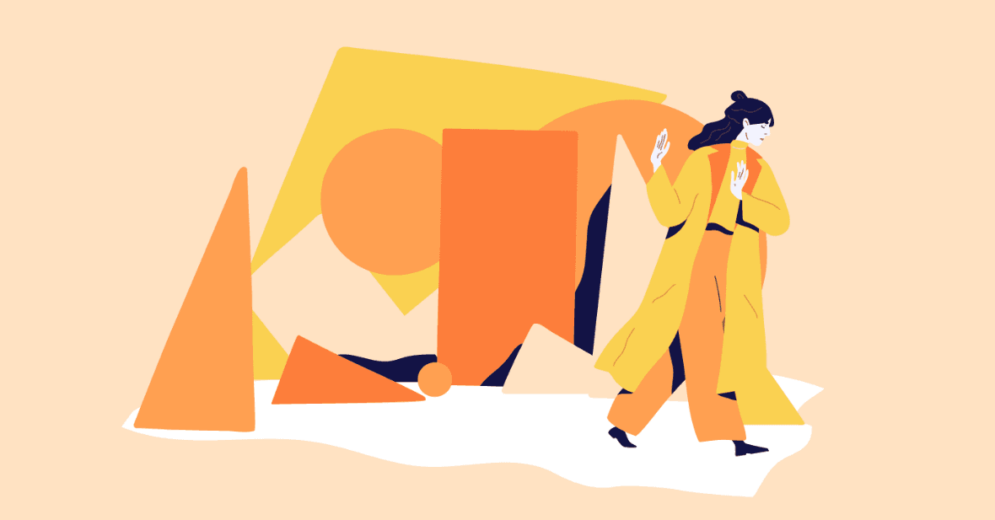Working isn't always easy, and having periods of low motivation is natural. However, when feelings of discomfort and unhappiness persist, the problem may be more significant than mere fatigue or a need for a vacation.
It's essential to pay attention to these signs and address them to ensure your well-being and job satisfaction.
The lack of motivation can come from a misalignment of personal goals with the work performed. It's extremely normal to have this kind of mismatch since life is dynamic and our personal goals are often changing.
But how do you know when it's time for a career change?
There are several indicators to look out for, and we've compiled a list of 7 signs that suggest it might be time for a change. If you're considering a new direction, the UX Design field could be your answer!
Reading Tip: What Is UX Design And How To Get Started?
1) Declining market
Perhaps your discouragement is associated with the job market you're in.
Lack of opportunities, undervalued positions, and companies in the sector closing their doors are signs that your job market may be declining.
Even if it's counterintuitive to sit down and watch everything fall, it's hard to decide on which field to venture into.
How to know which market is booming and has plenty of opportunities for growth?
We can't speak for other industries, but we can show that the UX Design field is growing exponentially and that there are several job opportunities.
A study conducted by Nielsen Norman Group (NN/g), the UX Design creators, shows that by the year 2050, there will be 100 million people working with UX.

Even with the pandemic and health crisis of 2020, the UX Design market has not stopped growing.
This is because at this time of isolation and quarantine, companies had to adapt their products and services to the digital world. To do this, they had to hire UX and Product Designers to make these transformations.
In other words, the UX Design market is growing, companies are hiring, and there is a need for new professionals in the field.
If you're demotivated with your current job because of a declining market, consider switching careers to UX!
Reading Tip: How to Pivot Into a UX Design Career: 10 Initial Steps
2) Low salaries
While it's true that every profession has the potential to evolve in terms of remuneration, it's crucial to recognize and seize these opportunities for growth. Otherwise, feelings of stagnation and undervaluation can take hold.
By staying mindful of these possibilities and actively pursuing career advancement, you can cultivate a sense of fulfillment and satisfaction in your work.
If the average salary in your profession is low and shows no signs of increasing, it's essential to pay attention. It's possible that your demotivation stems from this lack of financial growth and potential. A low salary can also signify undervaluation within your professional market, and in some cases, a career change may be the best solution.
But what professions and markets offer better salaries? As mentioned earlier, UX Design is a growing field with high demand and relatively low labor supply. As a result, companies tend to offer more competitive salaries to attract and retain talented professionals.
The 2019 Product Design Hiring Report by InVision shows that 84% of UX Designers interviewed had a salary increase in the last 2 years. Moreover, there is a projected 20% increase in salaries for UX Designers in the coming years, making it a promising career path for those seeking financial growth and career advancement.

Also, researching on the Glassdoor website (formerly Love Mondays), we can find an average salary for UX Design in large companies.

3) You are not learning new things
As you advance in your careers, you may eventually reach a stage where you have mastered all the necessary skills and are unable to grow or learn further, resulting in a feeling of stagnation and lack of progress.
Even if there are still new things to be learned in our profession, we can become tired of continually learning about the same old topics. If your lack of motivation at work is due to a lack of new challenges, learning opportunities, and personal growth, it may be time to consider a career change.
Switching careers can open up a whole new world of exciting challenges and learning experiences.
The field of UX Design is particularly well-suited for those who thrive on growth and evolution, as it is closely tied to the rapidly advancing world of technology.
In this dynamic field, there are always new and interesting topics to explore, making it an excellent choice for those seeking a career that will keep them engaged and fulfilled.
In addition, UX is multidisciplinary. The UX Designer moves between knowledge of Business, Psychology, and even writing tools, such as Storytelling. The more knowledge and experiences, the better.
Reading Tip: 9 Soft Skills to Stand Out as a Designer
4) You don’t find purpose in your work

This may be the most common sign among people who are demotivated with work.
You might spend the whole day going through your tasks, but at the end of it, you cannot see the impact of your work on others or the world around you.
This is especially true in professions where the connection between your actions and their outcomes is not always obvious.
Working without a clear purpose can be challenging and exhausting. If you find yourself in this situation, it might be time to consider a career change that aligns better with your professional and personal goals.
One field that can offer a sense of purpose is UX Design. As a UX designer, you can help transform people's lives by creating products that truly meet their needs and improve their experiences.
"And with UX/UI, I can really make a difference in someone's life. And always for the better. Address a pain or a need. Knowing what that person needs and being able to deliver the best to them." – Diogo Alvarez, MID student.
If you're passionate about technology and want to make a difference, UX design could be an ideal career path for you.
5) You only do operational work
There is nothing wrong with performing operational activities. There are people who are completely satisfied with their careers only doing operational work.
But maybe you are missing being closer to the company's strategies and intelligence. It is up to you, then, to analyze whether there is a possibility, within your career, of acting more strategically.
If there is no such possibility, perhaps it is time to change and switch careers.
Although, at first glance, the profession of UX Design may seem like an operational area, this is not true.
UX Design is a strategic area. It is through it that the company can increase its revenue and improve its relationship with customers.
It is no wonder that UX Designers need to know about business, as UX is an area that can bring many positive results to an organization.
A survey by InVision showed the following insight:
"When design is the focus of the organization, there is a direct and tangible impact on the company's results, such as its revenue, market value, and time to market." – The New Designer Frontier By InVision

So if you are considering a move to a more strategic career, UX Design will not disappoint you.
Reading Tip: How Product Design Impacts Business
6) You don’t have a good quality of life
Quality of life is an important aspect that varies from person to person. For some, quality of life means living close to work or having a short commute. For others, it's about having the flexibility to pick up their children from school or spend time pursuing hobbies and interests outside of work.
The truth is that quality of life has much to do with balancing personal and professional life.
UX Design offers many possibilities, easiness, and flexibilities, such as remote work and the possibility of working abroad.
Of course, everything depends on you, your professional goals, the company/position, and your current situation as a professional.
One thing is certain: companies need professionals and are becoming more flexible to meet their employees' needs. It no longer matters where the employee works or their exact working hours as long as they are productive.
We have many students who have transitioned to UX Design and work remotely.
Leonardo Spolador, for example, got an opportunity to work for a US-based company but performs his activities remotely from Brazil.
"I have been working in this format for about 2 years now. Of course, it's quite challenging at first because of the discipline required. But I believe it's all a matter of habit," says Leonardo Spolador, a MID student.
Check out other examples of our students:
- Bárbara Niriz — From Intern to remote Lead Designer in the US;
- Maria Resende — From Law to UX Design in Portugal;
- Daniel Hildebrandt — From Brazil to Product Designer in Canada.
Reading Tip: Remote Work: What is the Outlook During and After the Pandemic?
7) You want to have an international career

It's normal for people's goals to change over time, and sometimes this includes a desire to live abroad. However, not all professions offer the opportunity for an international career.
Fortunately, UX Design is a field that provides a high possibility of finding work opportunities outside of your home country. The demand for UX professionals is growing rapidly worldwide, and there are many companies looking for qualified individuals, regardless of their location.
If you have a passion for UX Design and a desire to explore the world, this field could be a great fit for you. Consider honing your skills and building your portfolio to prepare for an international career in UX Design, where you can make an impact on users around the globe.
We have many examples of students who have landed jobs in international companies:
- Israel Mesquita: works as a Product Designer in a company in Austria, where he currently lives;
- Inis Leahy: currently lives in Dublin and works as a Product Designer at Udemy
- Louise Santos: landed a job in New Zealand and works remotely for an American company.
- In addition to our students, our mentor and founder of Aela, Felipe Melo, has an international career, having worked in many companies and countries in Europe.
So, if you want to work internationally, switching careers to UX Design might be the right decision!
Can I switch careers even without a design background?
One of the most common concerns when transitioning careers is the academic background.
There is a lot of fear involved in starting a new profession from scratch, and the idea of working in UX Design without any prior exposure to design can be daunting.
However, you don’t need to worry.
It is possible to transition to UX Design without a background in Design. As mentioned earlier, UX Design is a multidisciplinary field, so a different background is actually appreciated during the hiring process.
Many of our students come from different backgrounds, such as Administration, Psychology, and Customer Service.
What matters most is how much you dedicate to learning new skills and the design process itself.








